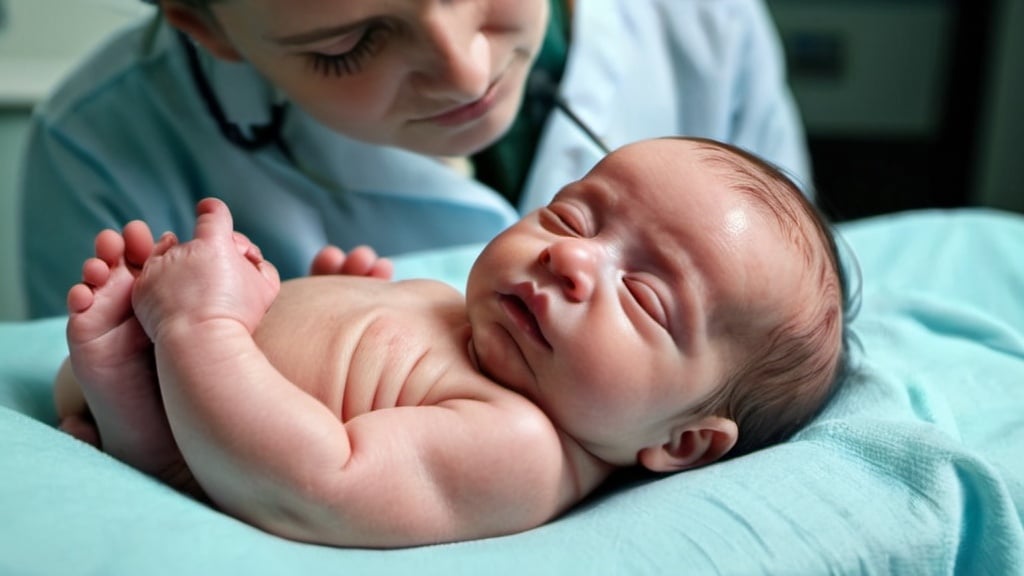1. Introduction
Tip one is to spend time thinking about choosing the right pediatrician. The second tip is to go to one last appointment with the chosen pediatrician. It is important to check if you can indicate what you think you will do while adhering to primary medical activities, addressing expectations, and possible guidelines. And even if you like the professional, ask him questions about the neonatal period. As baby care is the professional who takes care of them the most, it would be interesting to have similar concepts on issues and their care. Accompanying a neonatologist is not enough, as most neonatologists do not offer outpatient consultation and receive the newborn. The routine job for the first year of life, or even the next few years, depends even more on how easy it is to access the same pediatrician and will affect the quality of the care the baby will receive.
The first doctor visit with your baby is very nerve-wracking. Not only because you have just given birth and already have to drag yourself to the pediatrician, but also because the pediatrician you choose will also prevail in the setting of the interaction. And hopefully, you will maintain a good relationship as right now, this person will have the power of judgment (and a very loud voice) over everyone around the baby, including parents or in-laws. Therefore, I gathered seven tips to make your first visit to the pediatrician a little less anxious, quieter, and happier.
1.1. Purpose of the Blog
I want to emphasize that while the first visit is very important, this is only the beginning of a series of recommended well-child visits. A pediatrician is a specialist in child health and has many years of training providing medical care that goes beyond just treating illness. This post and the recommended well-child care schedule are designed to ensure that children grow up healthy and strong in both mind and body. Vaccines, physical exams, and developmental evaluations are all important aspects of well-child care. Review each of my tips and have a great visit!
This post is to help you ensure that you get the most out of your newborn’s first visit to the pediatrician. The tips apply best to healthy, full-term babies born in the hospital or birthing center, but most of the tips can be adapted to your specific situation.
2. Tip 1: Schedule the Appointment Wisely
By scheduling the visit wisely, any concerns, physical inquiries, and questions the mother or parent may have will comfortably be answered. Planning accordingly also prevents rushed, inconvenient, and potentially unsafe travels to the child’s first meeting with the doctor. Finally, refurbishing the healthy feeling of comfort and security for both the mother and the baby who might still be feeling postpartum recovery pain, and a foreign world transition could also be quite simplified.
In the event that an infant has been delivered at home, a doctor’s visit is likely necessary within 24-48 hours to ensure the baby is healthy. However, in most cases, hospitals already scheduled a checkup and/or vaccinated with a pediatrician before leaving the hospital. With that being said, provided a doctor’s visit has not already been scheduled, give a pediatrician’s office a call to let them know the baby is on the way. For convenience and/or if more pressing issues require immediate attention, call ahead to ensure the pediatrician is at the office at that particular time of day. Failing to do so could result in the arrival at the doctor’s office only for the doctor to leave and not return until the following day, putting off examination, treatment, and possibly the care that may follow.
2.1. Consider the Best Time of Day
Looking for a pediatrician who can provide good care for your child—both on weekdays and on weekends—is an important criterion to consider. The baby’s first few weeks are eventful ones. It’s reassuring to know that your little one can receive quality care should any problems arise. Also, establish a good relationship with the staff. The doctor may make an incorrect diagnosis mainly because the parent was not heard out or was not able to express themselves properly. Although obtaining details from the caregiver, e.g., nanny, about the baby’s health and normal activities is useful, it is significant for at least one of the parents to accompany the child at first. Later, when the pediatrician is familiar with your child’s history, other family members or caregivers may take subsequent visits.
The best time of day for a newborn’s first doctor visit is in the morning. In the morning, the baby is usually awake, active, and tends to be less fussy and clingy. Of course, the uniqueness of your child’s needs will determine the best choice of time, but the morning provides the most conducive atmosphere for a doctor’s visit. Also, punctuality is a courtesy. Therefore, confirm the time and be punctual for the scheduled appointment.
3. Tip 2: Prepare Necessary Documents
There is a big queue in children’s clinics, and sometimes a mother has to leave work for half a day or a day to arrange additional documents and answer fungal tests, so I advise you to do everything for this before the examination. Even easier: in the hospital or in a clinic for pregnant women, take a prepared package with all the documents for a successful first visit to the doctor. And also check the time and route to the children’s clinic in advance.
The first thing you have to prepare for the newborn’s first doctor visit is the hospital documents issued upon the child’s discharge. Usually, this is a yellow unlimited referral to a children’s clinic, a card with the results of screening tests for TB, HIV, hepatitis, and a neonatal blood sample. Consider preparing the original birth certificate, and it’s a good idea to provide a copy immediately so that it can be issued on the same day. Note: if the clinic does not have time to write out a medical card for the child the same day, the doctor will still examine the baby because the available documents are sufficient for this.
3.1. Medical History and Insurance Information
Newborn checklist: To have a successful and complete newborn visit, parents need to take some information that will be requested by the pediatrician. This information involves clinical data such as gestational age, pregnancy type, birth date, and measurements of birth weight, length, and head circumference. Be sure to take home a copy of the baby’s medical record from the nursery. Data about in-hospital newborn screening tests, maternal prenatal infections, and the mother’s and family’s medical history are important too. Information such as who the obstetrician/gynecologist or midwife was and when prenatal care was initiated and terminated is also important. Provide your pediatrician information regarding your previous pregnancy history, if your child was breastfed as a newborn, at which age the child started to eat solids, eat bottle or sippy cup fed, the last weight of the child, and sleep patterns.
Remember to bring any medical records or an updated immunization record, including the hospital discharge papers. Some hospitals provide a copy, but be sure to give your pediatrician a copy of your baby’s hospital discharge summary. The discharge summary contains data about the mother, maternal treatment received, the baby, and the newborn treatment received, so pediatricians can have more concise information on day one. It is also important to take the insurance card and documentation required by your insurance program. An example of the documentation that may be required is a state ID for the policyholder and an application or document from who determines the coverage program.
4. Tip 3: Pack a Diaper Bag Essentials
You can also put pacifiers, nursing pads, and nursing covers are essential additions for nursing mothers and their babies. If baby hasn’t eaten in a while, it is a good idea to feed your baby right before you leave for the doctor’s office or bring along a bottle or nursing cover in your diaper bag. A hungry baby is a fussy baby, and their appointment will suffer if they are hungry and uncomfortable during their visit. Remember that the best doctor visits occur when you make your baby as comfortable and happy as possible, given the circumstances.
The essentials to include in your diaper bag are everything you need to take care of your baby while on the go. First of all, bring baby’s changing pad, diapers, wipes and any diaper creams you may want to use. Babies get dirty diapers and empty tummies often, so make sure you are well prepared. Extra baby clothes and burp cloths are essential for cleaning spit up and protecting your baby from the elements. All-purpose blankets offer countless uses on chilly days, to shade baby from the sun, and to lay baby down on an unfamiliar surface. Baby lotion, wet wipes, diapers, a diaper bag, and any medications your doctor recommends are all important and their necessity should not be underestimated. Lastly, as infants are prone to spitting up and keeping baby’s clothes and bibs clean, always pack an extra change of clothes and burp cloths.
4.1. Diapers, Wipes, and Changing Pad
You’ll thank me later when you don’t have to go buy diapers right after you get home. The dang things are expensive, so be sure to get a few sizes and brands. Your baby may be an odd size, so ask for a few super giant newborn sizes. If the store stocks premium wipes, I get a travel wipe case (which holds about 5 wipes) and see how well they work in that – after all, you’re going to have some free time sometime to think of these things. And the real important thing about being prepared? If you have to go look for a pet bottle and shot glass for sterilization (for Mommy), picking up a package of diapers and wipes doesn’t add any time to your trip! And changing pads are a twenty-dollar investment that you can’t afford not to make. The hard plastic bottom across the top of these changing stations is terrible! Wally world carries a package of two portable changing pads in their baby section for $2.50, I believe. Unfortunately, they were sold out, so we had to go to Target and spend a little more – and that’s something else you can’t afford to wait for.
5. Tip 4: Dress Comfortably and Appropriately
Your baby’s first visit to the pediatric clinic is likely to be tiring, even if everything goes well. Therefore, you should take into account that you have to wait for a while at the clinic or head over to the pharmacy to pick up any prescribed medication. Consequently, doctors recommend either going to the clinic alone, without any siblings, so the baby is less affected or uncomfortable, or that you make arrangements and ask someone to accompany you and help you with the baby.
Newborns should be dressed comfortably and appropriately when going for their first doctor visit. If they are uncomfortable, they can start crying and it may be more difficult to calm them down. It may also be difficult to perform any required routine procedures such as vaccination if the baby is crying. Dress your baby lightly, avoid clothes with long sleeves or pants, and let them wear layers that are easy to remove. Additionally, head out to the pediatric clinic a little earlier or dress your baby up in layers if the weather is cold to avoid the cold and any anxieties from the baby being cold.
5.1. Easy-to-Remove Clothing
The checklist doesn’t have to be a daunting, time-consuming task. There are simple and effective guidelines to follow that can help inspire you during your baby’s first doctor visit. Just grab these tips to make the visit easy, informative and content. Make your mind go over the logistics of clothes, transport, and sleeping accessories. To help keep your checklist light-hearted, follow these below tips as some helpful reminders. If your baby gets stressed, remember to take any ease-making item that helps ease the transition from being at home to being in the doctor’s office.
Make sure that your baby is comfortably dressed. Taking baby out of a complicated outfit can be frustrating and time-consuming, and will make both of you and baby very agitated. Make sure that baby is clothed simply and comfortably to ensure that doctor checkups are easy and pleasant, and do not include any extra agitation. If the weather requires baby to be bundled up tighter, lay the blanket lightly around your newborn with the diaper area left easily accessible. This will help insulate the upper parts of baby’s body while still allowing the doctor to easily check baby’s vital areas in a warm doctor’s room.
6. Tip 5: Be Observant and Ask Questions
After arriving at the doctor’s office: is the baby making noise, moving around a lot? Is the baby hungry? Consider nursing the baby once the baby is in the room. This way, the baby will be calm and won’t be crying during the whole visit and will be able to go through without complications. Any time a baby has a problem, it will be crying, moving around, difficult to hear the mother or the doctor. A baby should be moving, making noise, with some crying and some hungry wailing. A baby that is quiet and still all the time is a baby in serious condition. The baby has very small organs that cannot take on much illness at all; an adult can be very ill and still be quiet without showing any signs of surgical distress. Keep the pediatrician interested in the baby’s welfare by asking questions and being observant. Alert pediatrics, do not wake them up.
Right after the birth, take a deep, careful look at the baby. Does the baby look healthy? Is the baby crying, moving around? How are its eyes, skin, and the umbilical cord? Notify the nurse if there are any health concerns. Be observant and notify! A minute spent noticing could mean the difference between life and death. Afterwards, inform the pediatrician of any changes from the first picture. This will indicate how well the baby is being taken care of.
6.1. Note Any Changes in Behavior
Wakeful periods vary from baby to baby. However, your baby is expected to sleep between feedings for short periods. You will probably feel that your baby’s list of actions is right because you are the one who is with your baby all the time. You will cause an impact like a caregiving team.
Most doctors will require a sick baby to visit before the next weight check. If you have concerns about your baby’s weight gain, you should track how much your baby is eating at every feed. Monitor what goes on with your baby’s urination. Most babies urinate 6 to 8 times per day. Some parents keep track of when a baby eats, pees, and poops by using an eating-peeing-pooping chart.
Some newborns can have a bowel movement with each feed. However, some can start having a bowel movement every few days. Look for a constipated baby with dry, hard stools.
Feeding and eating habits can change if your baby is sick. You may have a poor appetite and feel that your baby is not eating enough.
Note any changes in behavior. Start tracking changes a few days before the visit. Look for what may seem unusual from your baby’s normal behavior. Changes can indicate that your baby is sick. You would be paying extra attention to the following:
7. Tip 6: Stay Calm and Positive
As a parent who is attending their first newborn’s baby doctor visit, make sure you ask the doctor any questions you have about the baby’s health or the baby’s progress or behavior after the visit. Remember that the doctor is there to help the newborn grow up to be healthy and happy, and the parent should never feel like they are asking too many questions or wasting people’s time. Never be afraid to ask questions and help feels more comfortable and better understand the newborn’s early development.
Babies can sense tension in people, so if a parent is nervous, the newborn can quickly take notice of it and become distressed themselves. The experience can make the parents wary of doctor visits. So, the best path to take is to remain calm and positive and make sure the newborn is comfortable before the visit. Usually, if the parents are comfortable and prepared, so will the newborn. It’s important that the people who are caring for the baby the most for the first few weeks learn to notice their baby’s clues for any kind of distress or discomfort.
7.1. Comforting the Baby During Examinations
During the examination in the presence of the mother, we must take into account that the baby undergoes a strong emotional shake. In response to painful stimuli (tension), there is often a localized skin reaction – a nevi, which is often confused with hemangioma. This reaction is due to the emotional stress experienced by the baby. It is necessary to ask the baby’s mother about the presence of similar skin changes in themselves and relatives. If necessary, a pediatric dermatologist consultation is organized. All examinations must be done when the newborn is calm and do not cause discomfort. During the examination, one should hold the baby correctly: the mother’s voice and hands are the best reassurance and comfort. It should be explained to the fact that the baby is being examined. In the opposite case, with loyal positioning for the baby, we can lose deeper with the family. Do not stop or stop the examination to undress the baby. Only if you listen to the heart or lungs – you cannot do without this action. The baby’s comfort and security are paramount. While waiting for the pediatrician, it is important for the mother to talk to the mod. It is necessary to support the newborn and the mother to create favorable conditions for adaptation and socialization to outpatient service.
Based on official recommendations, an infant should not go to the nursery. They should be examined in the presence of the mother. During the examination, the baby should never be separated from the mother. Even if the mother feels anxiety, excitement, or uneasiness associated with the examination of the baby, it is necessary to restrain their emotions in the presence of the baby. It is necessary to comply with the regimen for the care of infants: not disturbing their sleep and feeding. Ensure the prescribed rest and sleep of the newborn and young child. Create a comfortable environment, taking into account the peculiarities of sensory perception such as lighting and room temperature. The newborn baby is best comforted by the voice of their mother or another close person who they have had time to get used to and find the familiar voice.
8. Tip 7: Follow Up and Implement Advice
By scheduling the follow-up appointments, you are keeping your newborn baby on track toward the scheduled immunizations that are needed shortly after the first newborn visit. Soon, making sure that you have enough supplies needed during your baby’s first week, such as changing a newborn’s diaper and supplies checks, new baby nail clipping, and new baby sponge baths, will be second nature. Ensure that you ask any questions and address any concerns which you have at these additional visits. You will have peace of mind that a professional is checking your baby’s growth and development. Should the development not follow the normal expected schedule, then it is important to address the red flag and have it checked immediately. Keeping your newborn baby happy and healthy is of the utmost importance and makes additional appointments necessary. Always check for red flags and address any concerns in a timely fashion for peace of mind.
After the newborn’s first doctor visit, it is imperative that as parents, we ensure all follow-up appointments are made and kept. This may include a follow-up visit to the hospital to weigh your baby each day until they are back to their birth weight (usually around ten days after birth), a midwife visit, or a doctor’s appointment. By making sure that you call your newborn’s doctor soon, you have already made a follow-up appointment before leaving. If not, simply call them to schedule any additional appointments necessary to keep the lines of communication open regarding your newborn’s health. This is essential to do as newborns are so vulnerable that you should double-check everything that has been said and diagnosed.
8.1. Medication Schedule and Next Appointment
The first few visits to the pediatrician with your newborn are particularly important, not only to check him or her out, but also to receive recommendations concerning its care, nutrition, and find out what vaccinations your baby might need. These are the first of several visits that your newborn has to make during the first years of life, until your baby is deemed a healthy child. It is critical to follow the pediatrician’s guidelines, as a guarantee for your baby’s good health and normal growth and development.
Following the pediatrician’s suggestions is another guarantee for the good health and the normal growth and development of your baby. Before you leave the doctor’s office, make sure you know the pediatrician’s recommendations – what medications you should give to your baby (if necessary), what their dose is, how many times a day you should administer them and what the schedule of subsequent follow-up appointments is. Most of the times the pediatrician fills out an examination chart and tells you when the next visit is due.
Want to dive deeper? Visit us for more information!
References:
Health Organization, W. “Pocket book of primary health care for children and adolescents: guidelines for health promotion, disease prevention and management from the newborn ….” 2022. who.int
Dumitriu, Dani, et al. “Outcomes of neonates born to mothers with severe acute respiratory syndrome coronavirus 2 infection at a large medical center in New York City.” JAMA pediatrics 175.2 (2021): 157-167. jamanetwork.com
Pansieri, Claudia, et al. “NASCITA Italian birth cohort study: a study protocol.” BMC pediatrics 20 (2020): 1-10. springer.com
Mercurio, M. R. and Cummings, C. L. “Critical decision-making in neonatology and pediatrics: the I–P–O framework.” Journal of Perinatology, 2021. [HTML]
Adam, Sumaiya, et al. “Pregnancy as an opportunity to prevent type 2 diabetes mellitus: FIGO Best Practice Advice.” International Journal of Gynecology & Obstetrics 160 (2023): 56-67. wiley.com
Toru, T. and Anmut, W. “Assessment of low birth weight and associated factors among neonates in Butajira General Hospital, South Ethiopia, cross sectional study, 2019.” International Journal Of Pediatrics, 2020. hindawi.com
Barnert, E. and DeBaun, M. R. “Increasing access to quality healthcare for children who are incarcerated: American Pediatric Society issue of the year (2023–2024).” Pediatric research, 2024. nih.gov
Kosmidou, Panagiota, et al. “Newborn hearing screening: analysing the effectiveness of early detection of neonatal hearing loss in a hospital in Greece.” Cureus 13.11 (2021). nih.gov
List, J. A., Pernaudet, J., and Suskind, D. L. “Shifting parental beliefs about child development to foster parental investments and improve school readiness outcomes.” Nature communications, 2021. nature.com
Obeagu, E. I. “An update on utilization of antenatal care among pregnant Women in Nigeria.” Int. J. Curr. Res. Chem. Pharm. Sci, 2022. researchgate.net






